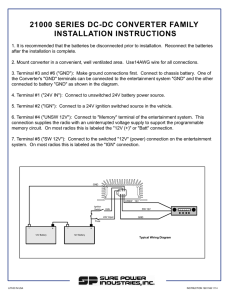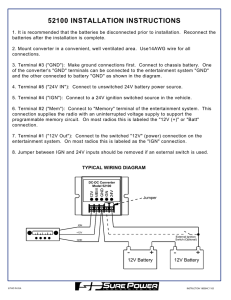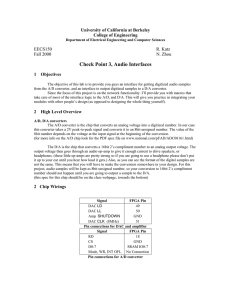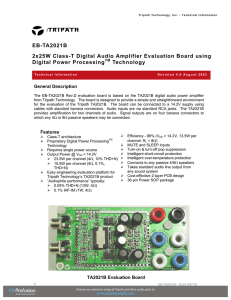EB-TA1101B Class-T Digital Audio Amplifier Evaluation Board using
advertisement
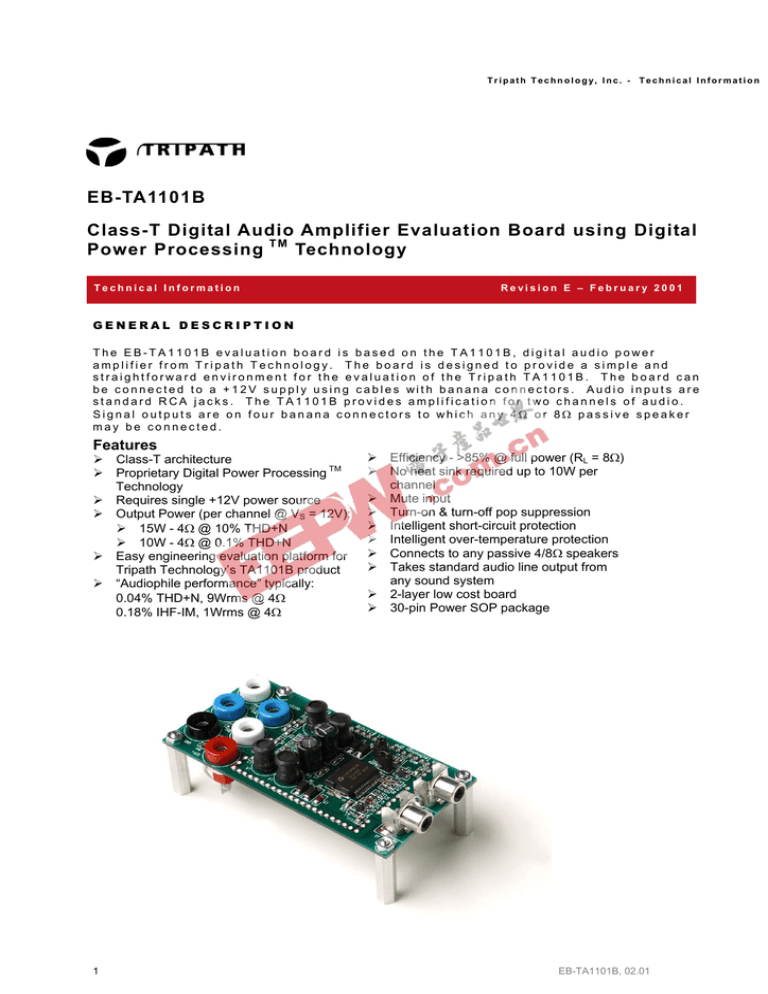
Tr i path Technol ogy, I nc. - Techni cal I nfor m ati on EB-TA1101B Class-T Digital Audio Amplifier Evaluation Board using Digital Power Processing T M Technology Technical Information Revision E – February 2001 GENERAL DESCRIPTION The EB-TA1101B evaluation board is based on the TA1101B, digital audio power amplifier from Tripath Technology. The board is designed to provide a simple and straightforward environment for the evaluation of the Tripath TA1101B. The board can be connected to a +12V supply using cables with banana connectors. Audio inputs are standard RCA jacks. The TA1101B provides amplification for two channels of audio. Signal outputs are on four banana connectors to which any 4Ω or 8Ω passive speaker may be connected. Features Class-T architecture Proprietary Digital Power Processing TM Technology Requires single +12V power source Output Power (per channel @ VS = 12V): 15W - 4Ω @ 10% THD+N 10W - 4Ω @ 0.1% THD+N Easy engineering evaluation platform for Tripath Technology’s TA1101B product “Audiophile performance” typically: 0.04% THD+N, 9Wrms @ 4Ω 0.18% IHF-IM, 1Wrms @ 4Ω 1 Efficiency - >85% @ full power (RL = 8Ω) No heat sink required up to 10W per channel Mute input Turn-on & turn-off pop suppression Intelligent short-circuit protection Intelligent over-temperature protection Connects to any passive 4/8Ω speakers Takes standard audio line output from any sound system 2-layer low cost board 30-pin Power SOP package EB-TA1101B, 02.01 Tr i path Technol ogy, I nc. - Techni cal I nfor m ati on Introduction The EB-TA1101B was designed to provide the designer with a simple means of evaluating the performance and functionality of the TA1101B 2x10W amplifier IC from Tripath Technology. The EB-TA1101B is very simple to operate and requires only a few things to get up and running: Stereo signal source 12V power supply (not to exceed 13.2V) Two loads (4-Ohm minimum) For more information on the TA1101B, please refer to the TA1101B datasheet (www.tripath.com). Power In +12V(red), Gnd(blk) In1 Output 1 Out1+(wht), Out1-(blu) Inputs Outputs In2 Sleep Mute Output 2 Out2+(wht), Out2-(blu) EB-TA1101B Board Connection and Operation Figure 1 shows the connections required for proper operation of the EB-TA1101B. Input Connection Audio input to the board is provided via two RCA female connectors. Connector Name IN1 IN2 Channel Channel 1 Input Channel 2 Input Power Connection The TA1101B requires a +12V power supply (13.2V max) to operate. Power to the board is provided via the red and black female banana connectors. The positive 12V from the power supply connects to the red banana connector labeled 12V+. The ground connection of power supply attaches to the black banana connector labeled GND. 2 EB-TA1101B, 02.01 Tr i path Technol ogy, I nc. - Techni cal I nfor m ati on +12V - + TA1101B Gnd In2 Mute Audio Source R Gnd Out1+ Out1Out2- Sleep Out2+ + + Speaker Right 12V+ Speaker Left In1 L Figure 1 Connector Label 12V+ GND Description Positive of the 12V Power supply Negative (GND) of 12V Power Supply Color Red Black Warning: Do not exceed Maximum Operating Supply Voltage of 13.2V Output Connection There are four female banana connectors on the evaluation board for speaker output. The TA1101B has differential outputs (bridged) so it requires two wires per channel to connect to each speaker. Connector Label Out1+ Out1Out2+ Out2- Description Positive output of Channel 1 Negative output of Channel 1 Positive output of Channel 2 Negative output of Channel 2 Color White Blue White Blue Jumper Settings There are two jumpers on the EB-TA1101B board, which should both be connected (shorted) for normal operation. Jumper, J1 connects the FAULT output to the MUTE pin, allowing the part to Mute itself when a Fault condition (over-current, etc.) is detected. Jumper, J2 connects the SLEEP pin to GND, effectively disabling SLEEP for normal operation. If J2 is removed, the part will go into SLEEP mode. Jumper Purpose J1 Connects FAULT to MUTE J2 Connects SLEEP to GND 3 EB-TA1101B, 02.01 Tr i path Technol ogy, I nc. - Techni cal I nfor m ati on Gain Settings The TA1101B amplifier gain can be adjusted by modifying external resister values. R2 and R5 are used to set the gain for Channel 1, while R4 and R6 set the gain for Channel 2. The equation for the gain setting is: R A V = 12 ⋅ f Ri Where, R371 For channel 1: A V _ Ch1 = 12 ⋅ R370 R372 For channel 2: A V _ Ch2 = 12 ⋅ R373 For a more detailed description, please refer to the TA1101B data sheet. Performing Measurements on the EB-TA1101B The TA1101B operates by generating a high frequency switching signal based on the audio input. This signal is sent through a low-pass filter that recovers an amplified version of the audio input. The frequency of the switching pattern is spread spectrum in nature and typically varies between 100kHz and 1MHz, which is well above the 20Hz – 20kHz audio band. The pattern itself does not alter or distort the audio input signal, but it does introduce some inaudible components. The measurements of certain performance parameters, particularly noise related specifications such as THD+N, are significantly affected by the design of the low-pass filter used on the output as well as the bandwidth setting of the measurement instrument used. Unless the filter has a very sharp roll-off just beyond the audio band or the bandwidth of the measurement instrument is limited, some of the inaudible noise components introduced by the TA1101B amplifier switching pattern will degrade the measurement. One feature of the TA1101B is that it does not require large multi-pole filters to achieve excellent performance in listening tests, usually a more critical factor than performance measurements. Though using a multi-pole filter may remove high-frequency noise and improve THD+N type measurements (when they are made with wide-bandwidth measuring equipment), these same filters degrade frequency response. The EBTA1101B Evaluation Board has a simple two-pole output filter with excellent performance in listening tests. (See Application Note 4 for more information on bench testing with Tripath Class-T amplifiers) EMI and Shielding The TA1101B evaluation board has perforated holes around the amplifier and associated circuitry so that an EMI shield can be soldered directly to the board. Due to the spread-spectrum nature of the Class-T amplifier (the energy is spread across a wider spectrum, instead of being concentrated at a single frequency), we have found that specific EMI shielding is typically not necessary for most applications where the amplifier board is mounted inside a chassis. However, a shield perimeter is still provided for use in more sensitive applications. (See Application Note 11 for more information on EMI) 4 EB-TA1101B, 02.01 Tr i path Technol ogy, I nc. - Techni cal I nfor m ati on CONTACT INFORMATION World Wide Sales Offices United States & Europe SE Asia & China Japan & Korea Jim Hauer Eugene Hsu Osamu Ito jhauer@tripath.com ehsu@tripath.com ito@tripath.com 408.567.3089 886.2.2653.7428 81.42.334.2433 TRIPATH TECHNOLOGY, INC 3900 Freedom Circle Santa Clara CA 95054 408.567.3000 www.tripath.com 5 EB-TA1101B, 02.01 Tr i path Technol ogy, I nc. - Techni cal I nfor m ati on 6 EB-TA1101B, 02.01 Tr i path Technol ogy, I nc. - Techni cal I nfor m ati on 7 EB-TA1101B, 02.01 A IN2 C24 100pF L2 C23 100pF FBM2125 C15 C14 2.2uF 2.2uF R4 20k R2 20k 0.1uF C26 R6 20k R5 20k OVERLOADB R7 8.2K, 1% C17 1uF 0.1uF C16 15 14 13 12 11 10 9 8 7 6 5 4 3 2 1 TA1101B J1 FAULT JUMPER MUTE AGND3 BIASCAP IN2 VP2 MUTE IN1 VP1 V5A AGND2 OVERLOADB REF AGND1 V5D DCAP1 DCAP2 U1 3 sq. in. of 1oz. copper directly under TA1101B on solder side of PC board with a 5 x 16 array of 14mil vias. 2. The MUTE function can be optionally tied to the FAULT pin to allow for an automatic reset in the event of an over current FAULT. 1. TA1101B inputs have a DC bias of 2.5V. If input preamp circuitry is NOT biased at 0V, C14 and C15 may need to be reversed. NOTES: J4 RCA J3 FBM2125 http://www.tripath.com * L1 COPPER AREA* HEATSLUG* 31 IN1 SLEEP FAULT PGND2 DGND OUTP2 VDD2 OUTM2 OUTM1 VDD1 OUTP1 NC VDDA PGND1 CPUMP +5GEN 16 17 18 19 20 21 22 23 24 25 26 27 28 29 30 JUMPER RCA + * C5 1uF SLEEP GND C7 0.1uF 1 J2 VDD C20 0.1uF R1 1Meg VDD D7 MBRS130T3 VDD L9 L7 D6 MBRS130T3 D5 MBRS130T3 180uF,25V C18 C19 180uF,25V + D8 MBRS130T3 C6 0.1uF VDD VDD 1 + + 10uH, 2A C22 0.47uF C28 0.47uF Date: Size B Title C11 1000pF 1000pF C9 C10 1000pF BN6 BN5 BN4 BN3 GND 12V+ C8 1000pF BN2 BN1 Monday, February 12, 2001 Sheet 1 TA1101B Evaluation Board of 1 Rev E OUT2+ OUT2- OUT1- OUT1+ Tripath Technology, Inc. Document Number C30 0.1uF C29 0.1uF GND 12V+ R9 10, 1/4W C12 0.47uF C21 1000pF R10 10, 1/4W C13 0.47uF FBM2125 C27 0.47uF L5 C25 0.47uF 10uH, 2A 10uH, 2A 10uH, 2A L6 L8 +12V_PLANE VDD A R10,R9 R7 R2, R4, R5, R6 R1 C6,C7,C16,C20,C26, C29, C30 C12, C13, C22,C25,C27,C28 C8,C9,C10,C11,C21 C23,C24 C18,C19 C17,C5 C15,C14 L6,L7,L8,L9 L1,L2,L5 D5,D6,D7,D8 U1 BN1, BN2, BN3, BN4, BN5, BN6 J3, J4 J1, J2 1 4 1 7 6 5 2 2 2 2 4 3 4 1 6 2 2 Reference 2 Quantity Bill Of Materials EB-TA1101B Revision: E TA1101B MBRS130T3 FBM2125 10uH, 2A 2.2uF 1uF 180uF,25V 100pF 1000pF 0.47uF 0.1uF 1Meg 20k 8.2K, 1% 10, 1/4W Value Header Connector Connector IC Diode Ferrite bead Inductor Capacitor Capacitor Capacitor Capacitor Capacitor Capacitor Capacitor Resistor Resistor Resistor Resistor Description Johnson Components Tripath On Semi Taiyo-yuden ISI RL622 Panasonic Mfgr/Part# 101-09XX-001 TA1101B MBRS130T3 FBMJ2125 HM330-T or TOKO 8RDY HFQ Header, 2-pin 0.1" RCA input jack PCB mount female banana Output protection diode Ferrite bead, 33ohms (100MHz) Output series inductor. Input coupling cap Low ESR, high temp aluminum elect. main output filter cap Feedback resistor Zobel resistor COMMENT
